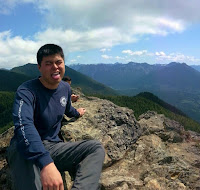Welcome First Years! Congrats on finishing the first week of classes in the 2015-2016 Academic Year at UW (#quartersystem). Just this time last year the rising second years were in your shoes. With the past year fresh in their minds, a few second years, Meg Whitney (Sidor Lab), Ethan Linck (Klicka Lab), and Will King (Sebens Lab) have teamed up to share some thoughts on the first year as a grad student.
TLDR: [Good for you! You’re already prioritizing like a grad student!] GO TO DISORIENTATION!
1. What is the key to succeeding during your first year?
Will King: Take breaks! Work at a sustainable pace.
Meg Whitney: The best advice and when things really clicked for me was when an older grad student told me that there was no right way to be a grad student and that you can make your grad school experience whatever you want it to be. When I stopped comparing myself to not only other first years but also older grad students, I felt much more at ease with being a grad student.
Ethan Linck: Define “success” as a series of tangible benchmarks (e.g., finish up that paper from your undergrad thesis, submit the GRFP application) rather than aiming for some sort of imprecise and unreachable standard of competence.
2. What was unexpected about your own experience?
WK: The extent to which I now cherish an hour of sunlight in winter. The importance of email brevity (cut in half, then half again). The beauty of Seattle.
MW: I was not expecting to have as much freedom with my own research. Pretty much from week 1 my advisor gave me a lot of encouragement to get going on my research which was awesome.
EL: Being a TA while attempting to navigate your first year of grad school is not so much a problem of time management (although that can certainly be an issue if you overcommit elsewhere) as it is a problem of energy management. Turns out teaching can be uniquely exhausting, even in short doses, and it’s best to approach scheduling your own research, classwork, and learning with a healthy respect for this fact.
3. What was the best advice you received?
WK: “Take agency of your grad school experience.” As in: expect not only to take the reins, but also to build the carriage. Might have to find wood for it first. Also, you’re the horse pulling the carriage.
EL: From our post-doc, after I became too comfortable writing from neighborhood cafés: Even if there’s no particular reason for you to be in lab (e.g., you aren’t working on a lab project), make a point of spending regular, consistent hours there. The simple act of being present exposes you to the countless little interactions (both professional and social) with colleagues that do wonders on both your academic progression and your general morale.
MW: [See #1]
4. What changed for you this year and what might you have done differently?
MW: It’s a steep learning curve which is awesome. I feel like I have learned more in the past year than I did in two years of undergrad. It feels terrifying, but if someone had told me it is like that for everyone and that during that time you’re actually learning a TON, I would have felt less worried.
EL: I’m hoping to spend more time reading papers. I wish I had read more consistently than I did.
WK: Acing coursework is no longer a top priority nor a regular source of sweet, sweet validation. Avoid overloading on classes… It’s tempting to try to learn everything.
5. Which was the must-attend BioGrad social event?
MW: Disorientation and bio grad retreat.
EL: Disorientation, no question.
WK: Do get to know your fellow grad students. They have diverse backgrounds, interesting passions, and, on occasions when the effort of sustaining friendships actually pays off, food to share.
Thank you Meg, Ethan, and Will! Well there you have it, First Years, everything you need to know! If we missed anything, additional good advice can be found here.





